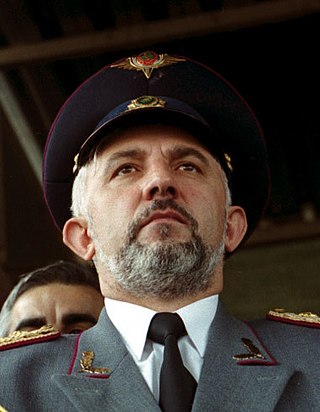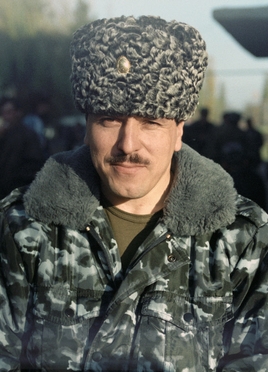Related Research Articles

The First Chechen War, also referred to as the First Russo-Chechen War, was a struggle for independence waged by the Chechen Republic of Ichkeria against the Russian Federation from December 11th, 1994 to August 31st, 1996. This conflict was preceded by the battle of Grozny in November 1994, during which Russia covertly sought to overthrow the new Chechen government. Following the intense Battle of Grozny in 1994–1995, which concluded as a pyrrhic victory for the Russian federal forces, their subsequent efforts to establish control over the remaining lowlands and mountainous regions of Chechnya were met with fierce resistance from Chechen guerrillas who often conducted surprise raids.

The Second Chechen War took place in Chechnya and the border regions of the North Caucasus between the Russian Federation and the Chechen Republic of Ichkeria, from August 1999 to April 2009.

Aslan (Khalid) Aliyevich Maskhadov was a Soviet and Chechen politician and military commander who served as the third president of the unrecognized Chechen Republic of Ichkeria.

Shamil Salmanovich Basayev, also known by his kunya "Abu Idris", was a North Caucasian guerilla leader who served as a senior military commander in the breakaway Chechen Republic of Ichkeria. He held the rank of brigadier general in the Armed Forces of Ichkeria, and was posthumously declared generalissimo. As a military commander in the separatist armed forces of Chechnya, one of his most notable battles was the separatist recapture of Grozny in 1996, which he personally planned and commanded together with Aslan Maskhadov. He also masterminded several of the worst terrorist attacks that occurred in Russia.
Said-Magomed Shamaevich Kakiyev is a colonel in the Russian Army, who was the leader of the GRU Spetsnaz Special Battalion Zapad ("West"), a Chechen military force, from 2003 to 2007. Inside Chechnya his men were sometimes referred to as the Kakievtsy. Unlike the other Chechen pro-Moscow forces in Chechnya, Kakiyev and his men are not former rebels and during the First Chechen War were some of the few Chechen militants who fought on the Russian side.

The Chechen Republic of Ichkeria, known simply as Ichkeria, and also known as Chechnya, is a former de facto state that controlled most of the former Checheno-Ingush ASSR.

Doku Khamatovich Umarov, also known as Dokka Umarov as well as by his Arabized name of Dokka Abu Umar, was a Chechen mujahid in North Caucasus. Umarov was a major military figure in both wars in Chechnya during the 1990s and 2000s, before becoming the leader of the greater insurgency in the North Caucasus. He was active mostly in south-western Chechnya, near and across the borders with Ingushetia and Georgia.

The 1999–2000 battle of Grozny was the siege and assault of the Chechen capital Grozny by Russian forces, lasting from late 1999 to early 2000. This siege and assault of the Chechen capital resulted in the widespread devastation of Grozny. In 2003, the United Nations designated Grozny as the most destroyed city on Earth due to the extensive damage it suffered. The battle had a devastating impact on the civilian population. It is estimated that between 5,000 and 8,000 civilians were killed during the siege, making it the bloodiest episode of the Second Chechen War.
Human rights violations were committed by the warring sides during the second war in Chechnya. Both Russian officials and Chechen rebels have been regularly and repeatedly accused of committing war crimes including kidnapping, torture, murder, hostage taking, looting, rape, decapitation, and assorted other breaches of the law of war. International and humanitarian organizations, including the Council of Europe and Amnesty International, have criticized both sides of the conflict for blatant and sustained violations of international humanitarian law.
In June 2000, the North Caucasian Chechen separatist-led Chechen insurgents added suicide bombing to their tactics in their struggle against Russia. Since then, there have been dozens of suicide attacks within and outside the republic of Chechnya, resulting in thousands of casualties among Russian security personnel and civilians. The profiles of the suicide bombers have varied, as have the circumstances surrounding the bombings.
The Nazran raid was a large-scale raid carried out in the Republic of Ingushetia, Russia on the night of June 21–22, 2004, by a group of Chechen militants led by Chechen commanders Shamil Basayev and Dokku Umarov. Basayev's main goal, besides capturing a large cache of weapons, was a show of strength. The attack by Chechen fighters on the Ingush city of Nazran is associated with the bad attitude of the Ingush authorities towards Chechen refugees.

The Grozny ballistic missile attack was a wave of Russian ballistic missile strikes on the Chechen capital Grozny on October 21, 1999, early in the Second Chechen War. The attack killed at least 118 people according to initial reports, mostly civilians, or at least 137 immediate dead according to the HALO Trust count. Hundreds of people were also injured, many of whom later died.

Vakha Arsanov was a vice president in the Aslan Maskhadov government of the Chechen Republic of Ichkeria.
References
- ↑ Asia Times: Russia employs NATO's 'barbarous' tactics
- ↑ CNN - Russia acknowledges bombing raids in Chechnya - August 26, 1999 Archived September 19, 2000, at the Wayback Machine
- ↑ CNN - Anti-Russian atrocities spur support for Chechen airstrikes - September 28, 1999
- ↑ Second Chechnya War
- ↑ RTÉ News: Russia launches more air strikes against Chechnya